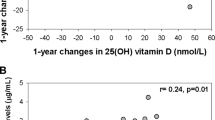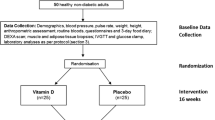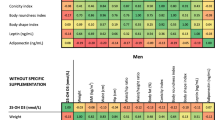Abstract
Purpose
Vitamin D regulates adipokine production in vitro; however, clinical trials have been inconclusive. We conducted secondary analyses of a randomized controlled trial to examine whether vitamin D supplementation improves adipokine concentrations in overweight/obese and vitamin D-deficient adults.
Methods
Sixty-five individuals with a BMI ≥ 25 kg/m2 and 25-hydroxyvitamin D (25(OH)D) ≤ 50 nmol/L were randomized to oral cholecalciferol (100,000 IU single bolus followed by 4,000 IU daily) or matching placebo for 16 weeks. We measured BMI, waist-to-hip ratio, % body fat (dual X-ray absorptiometry), serum 25(OH)D (chemiluminescent immunoassay) and total adiponectin, leptin, resistin, and adipsin concentrations (multiplex assay; flow cytometry). Sun exposure, physical activity, and diet were assessed using questionnaires.
Results
Fifty-four participants completed the study (35M/19F; mean age = 31.9 ± 8.5 years; BMI = 30.9 ± 4.4 kg/m2). After 16 weeks, vitamin D supplementation increased 25(OH)D concentrations compared with placebo (57.0 ± 21.3 versus 1.9 ± 15.1 nmol/L, p < 0.001). There were no differences between groups for changes in adiponectin, leptin, resistin, or adipsin in unadjusted analyses (all p > 0.05). After adjustment for baseline values, season, sun exposure, and dietary vitamin D intake, there was a greater increase in adiponectin (β[95%CI] = 13.7[2.0, 25.5], p = 0.02) and leptin (β[95%CI] = 22.3[3.8, 40.9], p = 0.02) in the vitamin D group compared with placebo. Results remained significant after additional adjustment for age, sex, and % body fat (p < 0.02).
Conclusions
Vitamin D may increase adiponectin and leptin concentrations in overweight/obese and vitamin D-deficient adults. Further studies are needed to clarify the molecular interactions between vitamin D and adipokines and the clinical implications of these interactions in the context of obesity.
Clinical trial registration
clinicaltrials.gov: NCT02112721
Similar content being viewed by others
References
Nakamura K, Fuster JJ, Walsh K (2014) Adipokines: A link between obesity and cardiovascular disease. J Cardiol 63(4):250–259. https://doi.org/10.1016/j.jjcc.2013.11.006
Bakhai A (2008) Adipokines—targeting a root cause of cardiometabolic risk. QJM: An Int J Med 101(10):767–776. https://doi.org/10.1093/qjmed/hcn066
Ouchi N, Parker JL, Lugus JJ, Walsh K (2011) Adipokines in inflammation and metabolic disease. Nat Rev Immunol 11(2):85–97. https://doi.org/10.1038/nri2921
Kong J, Chen Y, Zhu G, Zhao Q, Li YC (2013) 1,25-Dihydroxyvitamin D3 upregulates leptin expression in mouse adipose tissue. The J Endocrinol 216(2):265–271. https://doi.org/10.1530/joe-12-0344
Okazaki R, Toriumi M, Fukumoto S, Miyamoto M, Fujita T, Tanaka K, Takeuchi Y (1999) thiazolidinediones inhibit osteoclast-like cell formation and bone resorption in vitro1. Endocrinology 140(11):5060–5065. https://doi.org/10.1210/endo.140.11.7116
Sun X, Zemel Michael B (2012) Calcium and 1,25-dihydroxyvitamin D3 regulation of adipokine expression. Obesity 15(2):340–348. https://doi.org/10.1038/oby.2007.540
Kelly KA, Gimble JM (1998) 1,25-dihydroxy vitamin D3 inhibits adipocyte differentiation and gene expression in murine bone marrow stromal cell clones and primary cultures*. Endocrinology 139(5):2622–2628. https://doi.org/10.1210/endo.139.5.5970
Menendez C, Lage M, Peino R, Baldelli R, Concheiro P, Dieguez C, Casanueva FF (2001) Retinoic acid and vitamin D(3) powerfully inhibit in vitro leptin secretion by human adipose tissue. J Endocrinol 170(2):425–431
Liu E, Meigs JB, Pittas AG, McKeown NM, Economos CD, Booth SL, Jacques PF (2009) Plasma 25-hydroxyvitamin d is associated with markers of the insulin resistant phenotype in nondiabetic adults. J Nutr 139(2):329–334. https://doi.org/10.3945/jn.108.093831
Mousa A, Abell Sally K, Shorakae S, Harrison Cheryce L, Naderpoor N, Hiam D, Moreno-Asso A, Stepto Nigel K, Teede Helena J, Courten B (2017) Relationship between vitamin D and gestational diabetes in overweight or obese pregnant women may be mediated by adiponectin. Mol Nutr Food Res 61(11):1700488. https://doi.org/10.1002/mnfr.201700488
Roth CL, Elfers C, Kratz M, Hoofnagle AN (2011) Vitamin d deficiency in obese children and its relationship to insulin resistance and adipokines. J Obes 2011:495101. https://doi.org/10.1155/2011/495101
Gomez JM, Maravall FJ, Gomez N, Navarro MA, Casamitjana R, Soler J (2004) Relationship between 25-(OH) D3, the IGF-I system, leptin, anthropometric and body composition variables in a healthy, randomly selected population. Hormone Metab Res 36 (1):48–53. https://doi.org/10.1055/s-2004-814103
Tarcin O, Yavuz DG, Ozben B, Telli A, Ogunc AV, Yuksel M, Toprak A, Yazici D, Sancak S, Deyneli O, Akalin S (2009) Effect of vitamin D deficiency and replacement on endothelial function in asymptomatic subjects. J Clin Endocrinol Metab 94(10):4023–4030. https://doi.org/10.1210/jc.2008-1212
Vaidya A, Pojoga L, Underwood PC, Forman JP, Hopkins PN, Williams GH, Williams JS (2011) The association of plasma resistin with dietary sodium manipulation, the renin-angiotensin-aldosterone system, and 25-hydroxyvitamin D3 in human hypertension. Clin Endocrinol (Oxf) 74(3):294–299. https://doi.org/10.1111/j.1365-2265.2010.03922.x
Bellia A, Garcovich C, D’Adamo M, Lombardo M, Tesauro M, Donadel G, Gentileschi P, Lauro D, Federici M, Lauro R, Sbraccia P (2013) Serum 25-hydroxyvitamin D levels are inversely associated with systemic inflammation in severe obese subjects. Internal Emergency Med 8(1):33–40. https://doi.org/10.1007/s11739-011-0559-x
Vilarrasa N, Vendrell J, Maravall J, Elio I, Solano E, San Jose P, Garcia I, Virgili N, Soler J, Gomez JM (2010) Is plasma 25(OH) D related to adipokines, inflammatory cytokines and insulin resistance in both a healthy and morbidly obese population? Endocrine 38(2):235–242. https://doi.org/10.1007/s12020-010-9379-4
Maggi S, Siviero P, Brocco E, Albertin M, Romanato G, Crepaldi G (2014) Vitamin D deficiency, serum leptin and osteoprotegerin levels in older diabetic patients: an input to new research avenues. Acta Diabetol 51(3):461–469. https://doi.org/10.1007/s00592-013-0540-4
Minto C, Vecchio MG, Gregori D (2015) Effects of vitamin D supplementation on serum adiponectin: a metaregression analysis of clinical trials. FASEB J 29(1_supplement):LB347. https://doi.org/10.1096/fasebj.29.1_supplement.lb347
Mousa A, Naderpoor N, Teede H, Scragg R, de Courten B (2018) Vitamin D supplementation for improvement of chronic low-grade inflammation in patients with type 2 diabetes: a systematic review and meta-analysis of randomized controlled trials. Nutr Rev 76(5):380–394. https://doi.org/10.1093/nutrit/nux077
Belenchia AM, Tosh AK, Hillman LS, Peterson CA (2013) Correcting vitamin D insufficiency improves insulin sensitivity in obese adolescents: a randomized controlled trial. Am J Clin Nutr 97(4):774–781. https://doi.org/10.3945/ajcn.112.050013
Dinca M, Serban M-C, Sahebkar A, Mikhailidis DP, Toth PP, Martin SS, Blaha MJ, Blüher M, Gurban C, Penson P, Michos ED, Hernandez AV, Jones SR, Banach M (2016) Does vitamin D supplementation alter plasma adipokines concentrations? A systematic review and meta-analysis of randomized controlled trials. Pharmacol Res 107:360–371. https://doi.org/10.1016/j.phrs.2016.03.035
Wamberg L, Kampmann U, Stodkilde-Jorgensen H, Rejnmark L, Pedersen SB, Richelsen B (2013) Effects of vitamin D supplementation on body fat accumulation, inflammation, and metabolic risk factors in obese adults with low vitamin D levels—results from a randomized trial. Eur J Intern Med 24(7):644–649. https://doi.org/10.1016/j.ejim.2013.03.005
Mousa A, Naderpoor N, de Courten MPJ, Teede H, Kellow N, Walker K, Scragg R, de Courten B (2017) Vitamin D supplementation has no effect on insulin sensitivity or secretion in vitamin D–deficient, overweight or obese adults: a randomized placebo-controlled trial. Am J Clin Nutr 105(6):1372–1381. https://doi.org/10.3945/ajcn.117.152736
de Courten B, Mousa A, Naderpoor N, Teede H, de Courten MPJ, Scragg R (2015) Vitamin D supplementation for the prevention of type 2 diabetes in overweight adults: study protocol for a randomized controlled trial. Trials 16:335. https://doi.org/10.1186/s13063-015-0851-6
WMA (2013) World Medical Association declaration of helsinki: ethical principles for medical research involving human subjects. JAMA: J Am Med Assoc 310(20):2191–2194. https://doi.org/10.1001/jama.2013.281053
Hathcock JN, Shao A, Vieth R, Heaney R (2007) Risk assessment for vitamin D. Am J Clin Nutr 85(1):6–18
Ilahi M, Armas LA, Heaney RP (2008) Pharmacokinetics of a single, large dose of cholecalciferol. Am J Clin Nutr 87(3):688–691
Vieth R, Chan PC, MacFarlane GD (2001) Efficacy and safety of vitamin D3 intake exceeding the lowest observed adverse effect level. Am J Clin Nutr 73(2):288–294
Alberti KG, Zimmet PZ (1998) Definition, diagnosis and classification of diabetes mellitus and its complications. Part 1: diagnosis and classification of diabetes mellitus provisional report of a WHO consultation. Diabetic Med: J Br Diabetic Assoc 15 (7):539–553. https://doi.org/10.1002/(sici)1096-9136(199807)15:7%3C539::aid-dia668%3E3.0.co;2-s
Hanwell HE, Vieth R, Cole DE, Scillitani A, Modoni S, Frusciante V, Ritrovato G, Chiodini I, Minisola S, Carnevale V (2010) Sun exposure questionnaire predicts circulating 25-hydroxyvitamin D concentrations in Caucasian hospital workers in southern Italy. J Steroid Biochem Mol Biol 121(1–2):334–337. https://doi.org/10.1016/j.jsbmb.2010.03.023
Craig CL, Marshall AL, Sjostrom M, Bauman AE, Booth ML, Ainsworth BE, Pratt M, Ekelund U, Yngve A, Sallis JF, Oja P (2003) International physical activity questionnaire: 12-country reliability and validity. Med Sci sports Exerc 35(8):1381–1395. https://doi.org/10.1249/01.mss.0000078924.61453.fb
Baziar N, Jafarian K, Shadman Z, Qorbani M, Khoshniat Nikoo M, Abd Mishani M (2014) Effect of therapeutic dose of vitamin d on serum adiponectin and glycemia in vitamin d-insufficient or deficient type 2 diabetic patients. Iran 16(9):e21458. https://doi.org/10.5812/ircmj.21458
Gannage-Yared MH, Chedid R, Khalife S, Azzi E, Zoghbi F, Halaby G (2009) Vitamin D in relation to metabolic risk factors, insulin sensitivity and adiponectin in a young Middle-Eastern population. Eur J Endocrinol 160(6):965–971. https://doi.org/10.1530/eje-08-0952
Nimitphong H, Chanprasertyothin S, Jongjaroenprasert W, Ongphiphadhanakul B (2009) The association between vitamin D status and circulating adiponectin independent of adiposity in subjects with abnormal glucose tolerance. Endocrine 36(2):205–210. https://doi.org/10.1007/s12020-009-9216-9
Al-Daghri NM, Al-Attas OS, Alokail MS, Alkharfy KM, Al-Othman A, Draz HM, Yakout SM, Al-Saleh Y, Al-Yousef M, Sabico S, Clerici M, Chrousos GP (2013) Hypovitaminosis D associations with adverse metabolic parameters are accentuated in patients with Type 2 diabetes mellitus: a body mass index-independent role of adiponectin? J Endocrinol Investig 36(1):1–6. https://doi.org/10.3275/8183
Friedman JM, Halaas JL (1998) Leptin and the regulation of body weight in mammals. Nature 395:763. https://doi.org/10.1038/27376
Narvaez CJ, Matthews D, Broun E, Chan M, Welsh J (2009) Lean phenotype and resistance to diet-induced obesity in vitamin D receptor knockout mice correlates with induction of uncoupling protein-1 in white adipose tissue. Endocrinology 150(2):651–661. https://doi.org/10.1210/en.2008-1118
Hajimohammadi M, Shab-Bidar S, Neyestani TR (2016) Vitamin D and serum leptin: a systematic review and meta-analysis of observational studies and randomized controlled trials. Eu J Clin Nutr. https://doi.org/10.1038/ejcn.2016.245
Ghavamzadeh S, Mobasseri M, Mahdavi R (2014) The Effect of Vitamin D Supplementation on Adiposity, Blood Glycated Hemoglobin, Serum Leptin and Tumor Necrosis Factor-alpha in Type 2 Diabetic Patients. International journal of preventive medicine 5(9):1091–1098
Tabesh M, Azadbakht L, Faghihimani E, Tabesh M, Esmaillzadeh A (2014) Calcium-vitamin D cosupplementation influences circulating inflammatory biomarkers and adipocytokines in vitamin D-insufficient diabetics: a randomized controlled clinical trial. Journal of Clinical Endocrinology Metabolism 99(12):E2485–E2493. https://doi.org/10.1210/jc.2014-1977
Shah S, Wilson DM, Bachrach LK (2015) Large Doses of Vitamin D Fail to Increase 25-Hydroxyvitamin D Levels or to Alter Cardiovascular Risk Factors in Obese Adolescents: A Pilot Study. The Journal of adolescent health: official publication of the Society for Adolescent Medicine 57(1):19–23. https://doi.org/10.1016/j.jadohealth.2015.02.006
Maetani M, Maskarinec G, Franke AA, Cooney RV (2009) Association of Leptin, 25-Hydroxyvitamin D, and Parathyroid Hormone in Women. Nutrition cancer 61(2):225–231. https://doi.org/10.1080/01635580802455149
Matsunuma A, Horiuchi N (2007) Leptin attenuates gene expression for renal 25-hydroxyvitamin D3-1α-hydroxylase in mice via the long form of the leptin receptor. Arch Biochem Biophys 463(1):118–127. https://doi.org/10.1016/j.abb.2007.02.031
Laurikka A, Vuolteenaho K, Toikkanen V, Rinne T, Leppanen T, Tarkka M, Laurikka J, Moilanen E (2014) Adipocytokine resistin correlates with oxidative stress and myocardial injury in patients undergoing cardiac surgery. European journal of cardio-thoracic surgery: official journal of the European Association for Cardio-thoracic Surgery 46(4):729–736. https://doi.org/10.1093/ejcts/ezt634
Leivo-Korpela S (2014) Adipokines in Inflammatory Lung Diseases. University of Tampere, Finland
Martel-Pelletier J, Raynauld JP, Dorais M, Abram F, Pelletier JP (2016) The levels of the adipokines adipsin and leptin are associated with knee osteoarthritis progression as assessed by MRI and incidence of total knee replacement in symptomatic osteoarthritis patients: a post hoc analysis. Rheumatology 55(4):680–688. https://doi.org/10.1093/rheumatology/kev408
Brady SRE, Mousa A, Naderpoor N, de Courten MPJ, Cicuttini F, de Courten B (2018) Adipsin Concentrations Are Associated with Back Pain Independently of Adiposity in Overweight or Obese Adults. Frontiers in Physiology 9:93. https://doi.org/10.3389/fphys.2018.00093
Al-Daghri NM, Al-Attas OS, Alokail MS, Alkharfy KM, Al-Othman A, Draz HM, Yakout SM, Al-Saleh Y, Al-Yousef M, Sabico S, Clerici M, Chrousos GP (2013) Hypovitaminosis D associations with adverse metabolic parameters are accentuated in patients with Type 2 diabetes mellitus: a body mass index-independent role of adiponectin? J Endocrinol Invest 36(1):1–6. https://doi.org/10.3275/8183
Parikh S, Guo DH, Pollock NK, Petty K, Bhagatwala J, Gutin B, Houk C, Zhu H, Dong Y (2012) Circulating 25-hydroxyvitamin D concentrations are correlated with cardiometabolic risk among American black and white adolescents living in a year-round sunny climate. Diabetes care 35(5):1133–1138. https://doi.org/10.2337/dc11-1944
Zhang M, Gao Y, Tian L, Zheng L, Wang X, Liu W, Zhang Y, Huang G (2017) Association of serum 25-hydroxyvitamin D3 with adipokines and inflammatory marker in persons with prediabetes mellitus. Clinica chimica acta; international journal of clinical chemistry 468:152–158. https://doi.org/10.1016/j.cca.2017.02.022
Kocot J, Dziemidok P, Kiełczykowska M, Kurzepa J, Szcześniak G, Musik I (2018) Is There Any Relationship between Plasma 25-Hydroxyvitamin D(3), Adipokine Profiles and Excessive Body Weight in Type 2 Diabetic Patients? International Journal of Environmental Research Public Health 15(1):19. https://doi.org/10.3390/ijerph15010019
Ismail MM, Abdel Hamid TA, Ibrahim AA, Marzouk H (2017) Serum adipokines and vitamin D levels in patients with type 1 diabetes mellitus. Archives of medical science: AMS 13(4):738–744. https://doi.org/10.5114/aoms.2016.60680
Stepien M, O’Mahony L, O’Sullivan A, Collier J, Fraser WD, Gibney MJ, Nugent AP, Brennan L (2013) Effect of supplementation with vitamin D(2)-enhanced mushrooms on vitamin D status in healthy adults. Journal of Nutritional Science 2:e29. https://doi.org/10.1017/jns.2013.22
Al Haj Ahmad RM, Al-Domi HA (2017) Vitamin D Insufficiency Predicts Elevated Levels of Complement 3 Independent of Insulin Resistance and BMI. Journal of nutritional science vitaminology 63(3):155–160. https://doi.org/10.3177/jnsv.63.155
Gado KH, Gado TH, Samie RMA, Khalil NM, Emam SL, Fouad HH (2017) Clinical significance of vitamin D deficiency and receptor gene polymorphism in systemic lupus erythematosus patients. The Egyptian Rheumatologist 39(3):159–164. https://doi.org/10.1016/j.ejr.2016.11.003
Mok CC, Birmingham DJ, Ho LY, Hebert LA, Song H, Rovin BH (2011) Vitamin D deficiency as marker for disease activity and damage in systemic lupus erythematosus: a comparison with anti-dsDNA and anti-C1q. Lupus 21(1):36–42. https://doi.org/10.1177/0961203311422094
Alkhedaide AQH, Alshehri ZA, Soliman MM, Althumali KW, Abu-Elzahab HS, Baiomy AA (2016) Vitamin D3 supplementation improves immune and inflammatory response in vitamin D deficient adults in Taif, Saudi Arabia. Biomed Res 27(4):1049–1053
Karimzadeh H, Shirzadi M, Karimifar M (2017) The effect of Vitamin D supplementation in disease activity of systemic lupus erythematosus patients with Vitamin D deficiency: A randomized clinical trial. Journal of Research in Medical Sciences: The Official Journal of Isfahan University of Medical Sciences 22:4. https://doi.org/10.4103/1735-1995.199089
VicHealth (2015) A study of UV and vitamin D in Melbourne adults: Research summary. Victorian Health Promotion Foundation, Melbourne
Shea MK, Booth SL, Massaro JM, Jacques PF, D’Agostino RB, Dawson-Hughes B, Ordovas JM, O’Donnell CJ, Kathiresan S, Keaney JF, Vasan RS, Benjamin EJ (2008) Vitamin K and Vitamin D Status: Associations with Inflammatory Markers in the Framingham Offspring Study. Am J Epidemiol 167(3):313–320. https://doi.org/10.1093/aje/kwm306
Acknowledgements
We thank all volunteers who participated in the trial, as well as our research assistants Mrs. Nicole Ng and Mrs. Rebecca Chandra for their assistance in running the trial, and Dr. Eveline Jona and Dr. Melanie Gibson-Helm for the random assignment of participants.
Funding
AM is supported by a Postdoctoral Bridging Fellowship provided by Monash University. MP is supported by a Senior Research Fellowship (APP490977) from the National Health and Medical Research Council (NHMRC) of Australia. BdC is supported by a National Heart Foundation Future Leader Fellowship (100864) and is the recipient of the NHMRC grant which funded this trial (APP1047897).
Author information
Authors and Affiliations
Contributions
AM conducted the research, analyzed the data, and wrote the first draft of the paper. NN conducted the research and contributed to writing the manuscript. KW performed the laboratory analyses and contributed to writing the manuscript. MP supervised the laboratory analyses and contributed to writing the manuscript. MdC, RS, and BdC designed the research and contributed to writing the manuscript. BdC is the chief investigator of the trial, supervised data collection and analysis, and is the guarantor of this work and takes responsibility for data integrity and accuracy. All authors meet the ICMJE criteria for authorship, and have approved the final version of the manuscript.
Corresponding author
Ethics declarations
Conflict of interest
All authors declare no conflicts of interest.
Electronic supplementary material
Below is the link to the electronic supplementary material.
Rights and permissions
About this article
Cite this article
Mousa, A., Naderpoor, N., Wilson, K. et al. Vitamin D supplementation increases adipokine concentrations in overweight or obese adults. Eur J Nutr 59, 195–204 (2020). https://doi.org/10.1007/s00394-019-01899-5
Received:
Accepted:
Published:
Issue Date:
DOI: https://doi.org/10.1007/s00394-019-01899-5




